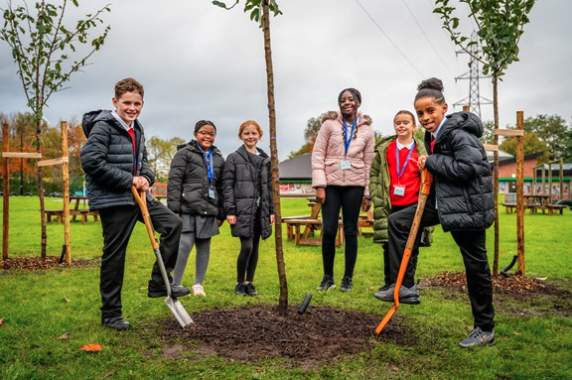Since the Council launched Manchester’s first tree strategy in 2005 more than 125,000 trees and tree hedges including 125 community orchards and fruit tree groves have been planted across the city by the Council, partner organisations such as City of Trees, the orchard project and others.
This year the Council is planting 745 trees over the next six months. Among the beneficiaries are St Willibrord’s RC Primary School in Clayton, where six new fruit trees – two apple, two cherry and two plum – were planted this week.
An emerging 10-year Tree and Woodland Action Plan, which will be considered at the Environment, Climate Change and Neighbourhoods Scrutiny Committee on 9 November, sets out an ambition to boost Manchester’s tree cover.
A council-commissioned Growing Manchester’s Trees study, looking at how the city’s treescape has evolved and how it can be improved, concluded that there is significant scope to increase the city’s tree canopy cover from its current level of almost 19% of tree cover to almost 22%.
The draft Tree and Woodland Action Plan envisages the Council working with organisations and other stakeholders across the city towards that goal -which it is estimated will require 64,000 new trees, equivalent to 320 hectares of extra tree cover (an area the size of 600 football pitches.)
Reaching this ambition will require new collaborative bids to sources such as the Government’s Urban Tree Challenge Fund.
Manchester people will be consulted on the new Tree and Woodland Action Plan, which sits alongside the Council’s existing Green and Blue Infrastructure Strategy (to promote and protect green open spaces and waterways) before it is officially adopted early in 2024.
Councillor Tracey Rawlins, Executive Member for Environment , said:
“With every year that passes, it feels like we understand more about the benefits of trees – not just in combatting climate change by removing and storing carbon but also in supporting resilience to its impacts by reducing flood risks and providing shade. This is in addition, of course, to them being a wildlife habitat and contributing to the appeal of neighbourhoods.
“Tens of thousands of trees have been planted since we first started looking at this issue strategically and we now have a better understanding than ever of where our trees are and where more are needed.
“Now we want to work with residents and organisations in the city to support the planting of even more.
“The enthusiasm of the pupils at St Willbrord’s shows that our children understand the importance of growing for the future.”
Carl McIver, Head teacher of St Willibrord’s RC Primary School, said:
“Developing our school grounds is a high priority for St Willibrord’s and we are delighted with the support we have been given by Manchester City Council to begin the planting of our orchard.
“As a school we are always looking at how we can educate our children about our environment and how we can support it. We see the planting of these trees as the beginning of a fantastic ongoing project to use our own school grounds and the local environment to support our planet.
“We are very much looking forward to being able to sample our St Willibrord’s fruit and it becoming part of our healthy food menu. Our pupils are excited about the opportunity to care and nurture for these new trees.”
